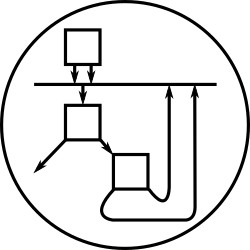Arithmetic is the Simplest Thing That Could Possibly Work
This page is a mirrored copy of an article originally posted on the (now sadly defunct) LShift blog; see the archive index here.
Mon, 28 November 2005
In an essay by Marvin Minsky I read over the weekend, Communication with Alien Intelligence, Minsky explores the idea that arithmetic spontaneously arises in computing systems, analogously to the spontaneous assembly of amino acids in the Miller/Urey Experiment. In the process of exploring the first few thousand simplest Turing machine programs, he and his student discovered that the only really interesting behaviour exhibited was a simple form of counting.
After a bit of musing along the main theme of the paper, there’s this interesting aside:
I wonder if it’s dangerous to make our children think so much about arithmetic–if, when it’s seen this way, it leads to such a singularly barren world. Some of us discover in it a universe of different ways to add, and different ways to think up more such ways. But most children find it dull–just endless, pointless pain and rote–the tedium of working abstract clay too cold and stiff to mold and shape. The only ones who benefit are those who, seeing that they cannot bend the rules, distort instead the ways they’re used.
In other words, arithmetic is such a cold, inflexible, crystalline structure, that you have to be really desperate for something interesting to do with it in order to escape from its boring homogeneity.
Comments
On 2 December, 2005 at 4:31 pm, wrote:
On 10 January, 2006 at 4:47 am, wrote:
I find symbolic processing a very interesting skill. While it is true that symbolic processing imposes artificial limits this is not always the case. Reading Richard Feynman has been an eye opening experience and makes me wish I had more time to study physics. The most interesting aspects I have found is that there is no meaning in theoretical calculations except that they work. The numbers themselves although interesting sometimes seem to lead to patterns we think we should understand. Since the only requirement is that a formula produces the correct result, how we get there is actually irrelevant. What is also interesting is the ways that math has been extended when symbols were not enough like the arrows of quantum physics. I also think that these frameworks can be fun, like symbolic logic, which I thoroughly enjoyed, but which indeed take a minimum level of skill. Symbolic logic can provide plenty of enjoyment especially when watching politicians. These symbolic processing frameworks are only as limited as we allow them to limit us and should only be considered a starting point for developing that skill.

There’s a couple of interesting claims made by Martin Hughes in Children and Number.
Firstly, that children are reluctant to connect symbolic arithmetic to real world objects, and that this is not a problem with abstraction, but with language. Children can perform arithmetic using objects, and give correct answers to arithmetic problems, but are frequently unable to translate between the two.
Secondly, that children simply do not see mathematic notation as a language. They struggle to find interpretations of such fragments as ‘+ 5′ and ‘3 = 3′. The equals sign is commonly seen as an operation (as in the calculator button), rather than a relation.
These suggest to me that children find arithmetic uninteresting because it doesn’t occur to them to try expressing things other than sums using it; there are plenty of interesting things to explore in arithmetic without needing more than addition and multiplication and natural numbers.